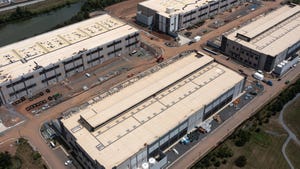Data Center News Roundup: Meta Plans $800M Wyoming Facility, Google Misses Emissions TargetsData Center News Roundup: Meta Plans $800M Wyoming Facility, Google Misses Emissions Targets
In this week’s top data center news, Cheyenne will be home to Meta’s newest data center, and Google falls short of its sustainability goals.

With data center news moving faster than ever, we want to make it easy for industry professionals to cut through the noise and find the most important stories of the week.
The Data Center Knowledge News Roundup brings you the latest news and developments across the data center industry – from investments and mergers to security threats and industry trends.
To keep up to date with all things data centers, subscribe to the Data Center Knowledge newsletter to get content straight to your inbox.
Hyperscale Announcements
Meta has unveiled plans to develop a hyperscale data center in Cheyenne, Wyoming. Once complete, the $800 million, 715,000 sq ft campus will be the Facebook owner’s 21st data center in the US and 25th globally.
“Cheyenne stood out as an outstanding location for Meta to call home for a number of reasons,” the company said this week. “It provides good access to infrastructure and energy, it has a strong pool of talent, and we have found a great set of community partners that have helped us move this project forward.”
Regional news publication Cowboy State Daily has been keeping a close eye on Meta’s expansion in Wyoming. According to the paper, a $1.2 billion solar project is planned near the data center with the capacity to produce enough electricity to run 771,000 homes.
Elsewhere, Amazon will partner with the Australian government for a cloud data system to handle top secret information, in a move that’s aimed at improving the nation’s cyber capabilities.
Deputy Prime Minister Richard Marles announced the partnership with Amazon Web Services, the company’s cloud division, at a press conference in Canberra this week, saying the government would invest at least A$2 billion ($1.3 billion) over the next decade in the new system.
The location of the data centers and the nature of the information they will be holding weren’t disclosed.
In other news, Gulf Energy will spend $271 million to expand its existing data center facility in Bangkok, Thailand, AQ Compute has started the construction of a new sustainable data center in Barcelona, Spain, and Northern Data is considering a $16 billion IPO as it looks to expand its data centers.
For more of the latest data center developments around the world, check out our July roundup.
Falling Short
In other hyperscale news this week, Google said its emissions shot up by 48% over five years, as the company has infused artificial intelligence throughout many of its core products – making it harder to meet its goal of eliminating carbon emissions by 2030.
Google’s annual sustainability report was released Tuesday (July 2) and covers the tech giant’s progress toward meeting its environmental goals. The company said its greenhouse gas emissions totaled 14.3 million metric tons of carbon dioxide equivalent throughout 2023. This is 48% higher than in 2019, the company said, and 13% higher than in 2022.
Google said higher energy consumption at its data centers and emissions from its supply chain were to blame and said its push to add AI to its products could make it more difficult to reduce emissions going forward.
“As we further integrate AI into our products, reducing emissions may be challenging due to increasing energy demands from the greater intensity of AI compute, and the emissions associated with the expected increases in our technical infrastructure investment,” Google wrote in the report.
Cool Runnings
Data Center Knowledge recently sat down with Peter de Bock, head of the US Department of Energy’s ARPA-E initiative, who discussed the critical challenges of data center cooling.
As AI workloads surge, efficient thermal management has become pivotal. In this exclusive interview, de Bock discusses the opportunities and hurdles impacting the COOLERCHIPS initiative, which aims to cut typical data center cooling energy to under 5%.
“As we further integrate AI into our products, reducing emissions may be challenging due to increasing energy demands from the greater intensity of AI compute, and the emissions associated with the expected increases in our technical infrastructure investment,” de Bock said.
Check out the full article to learn more.
Internet Speed Record Broken
And finally, an international team of researchers has set a new world record for the world’s fastest internet speed – at a blistering 402 terabits per second (Tb/s).
The team, led by the Photonic Network Laboratory of the National Institute of Information and Communications Technology (NICT) in Japan, demonstrated a record-breaking optical transmission bandwidth of 37.6 THz to enable the new data-rate record in a standard commercially available optical fiber.
At this speed, it would take just one minute to download every movie listed on the Internet Movie Database and less than a millisecond to install the popular video game, Elden Ring.
“It is expected that the data-rate of optical transmission systems required to enable ‘Beyond 5G’ information services will increase enormously,” NICT said in a press release. “New wavelength regions enable deployed optical fiber networks to perform higher data-rate transmission and extend the useful life of existing network systems.”
Other Great Reads on DCK This Week
Maximize ROI: 6 Key Questions for Effective Data Center Optimization. Ask these six essential questions to streamline your data center optimization efforts and enhance operational efficiency.
Patch Now: Cisco Zero-Day Under Fire From Threat Group. Threat actors are understood to be exploiting a vulnerability in Cisco's NX-OS data center software.
Talen Energy Defends Interconnection Agreement for Amazon Data Center. It doesn’t appear that a protest by AEP and Exelon at the Federal Energy Regulatory Commission poses a significant risk to the agreement, according to observers.
Consumer Regulated Electricity: The Path to Faster, Reliable Power Solutions? There’s a growing understanding that we’re running out of electricity in the US. How can that be? More importantly, what can we do to fix it, asks Glen Lyons.
AI vs. ESG – A Pressing Business Conundrum. Balancing AI adoption with sustainability is a pressing challenge for businesses. Eva Sóley Guðbjörnsdóttir explains how strategic data center location can help.
About the Author
You May Also Like









